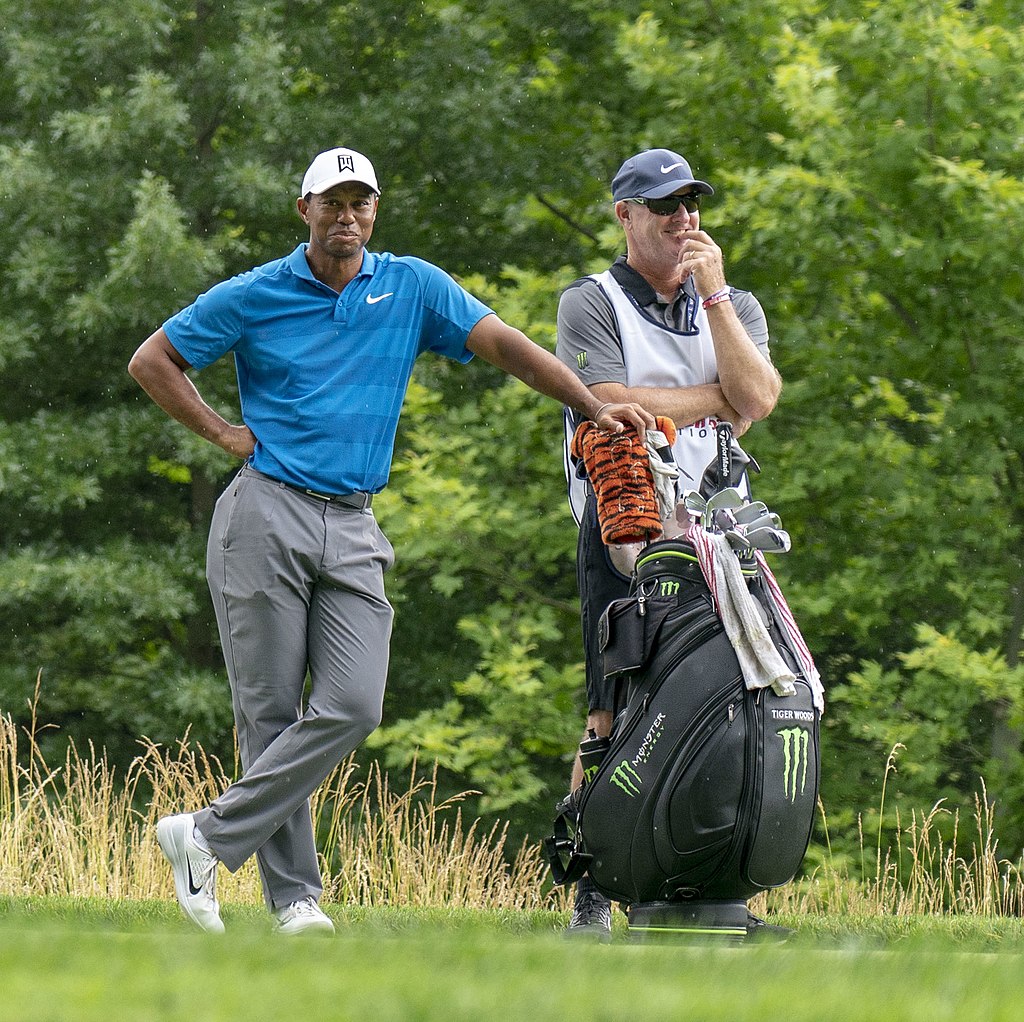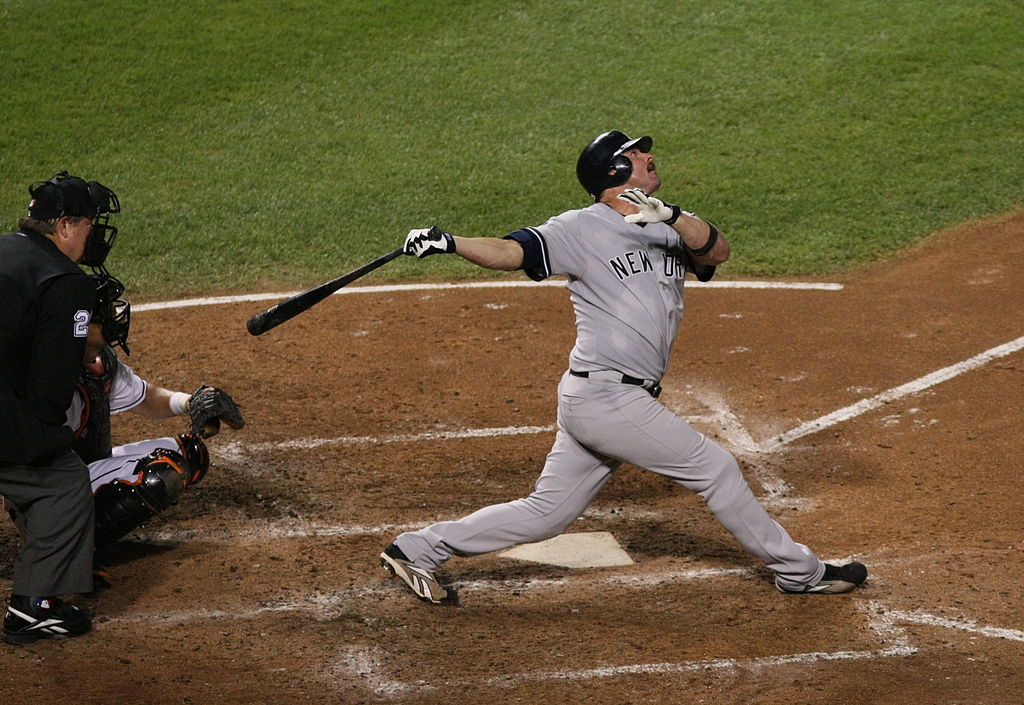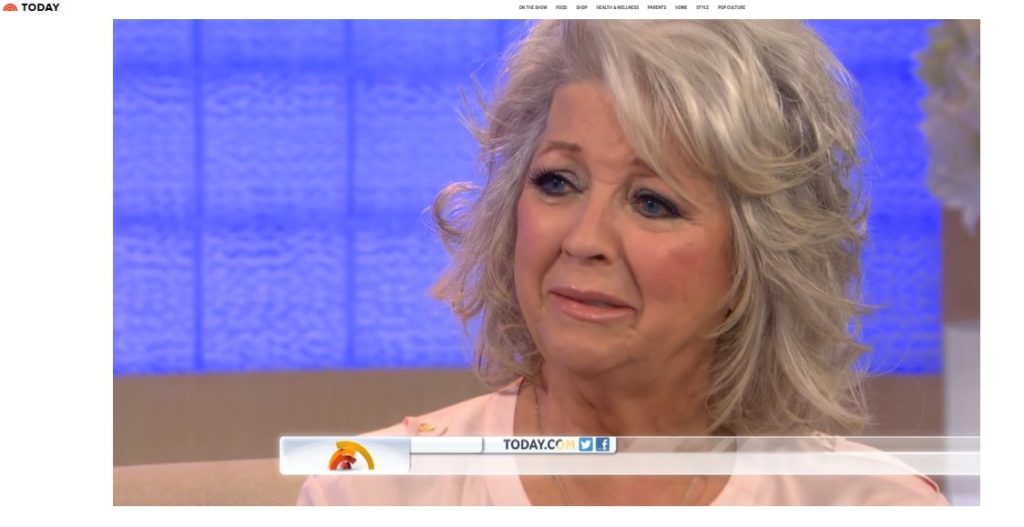Celebrity Endorser Gone Rogue? 3 Ways to Ease the Damage

Tiger Woods, with his caddie Joe LaCava, plays in the Pro-Am prior to the Quicken Loans National at TPC Potomac golf club in Potomac, Maryland on June 27, 2018. Nike opted to maintain Woods as a celebrity endorser despite the golfers’ personal scandals. Credit: KA Sports Photos/Hanover, Maryland. Licensed under CC BY-SA 2.0
Imagine that the baseball slugger who is endorsing your company’s products admits to using performance-enhancing drugs.
Maybe the wholesome 15-year-old star who leads a supremely successful television show on the network you run is featured in a provocative photo shoot for a national magazine.
Or, the celebrity chef who is the face of your brand confesses to using racial slurs.
These are not fictitious scandals. For Nike, it was Jason Giambi in 2005. For Disney, it was Miley Cyrus in 2008. For Smithfield Foods, Walmart, and others it was Paula Deen in 2013.

Miley Cyrus performs on the Today Show in Manhattan for Fleet Week New York. Early on in her career, a racy photo shoot created problems for her then-employer, Disney. Credit: U.S. Navy/Mass Communication Specialist 3rd Class Casey J. Hopkins
With companies increasingly relying on celebrity or “online famous” endorsers to testify to their brand, they introduce the risk that they can become embroiled in the public backlash when a social media influencer, public figure, or high-profile employee is caught up in behavior that is bad or is inconsistent with the brand.
When such crisis is brewing, do you keep that endorser on the line or cut bait?
The decision to keep or sever ties with a celebrity endorser caught up in negative publicity is not always easy. The challenges are many:
- The fast-paced media firestorm that typically follows the revelation of bad, unacceptable, or cringe-worthy behavior
- The limited time to make a focused and measured decision
- The expectations of shareholders
- The prospect of long-term gain despite the short-term pain
- The contractual complexities of the endorsement relationship
- The public’s reaction
While research has found that companies can take a financial hit when a celebrity endorser becomes stuck in a scandal, two researchers recently took a new look at the problem:
What corporate responses might reduce the negative stock market effects? Are there specific ways that firms can ward off lower sales and profits, a drop in market value, and falling stock prices?
“The academic literature did not offer any practical guidance,” said Stefan Hock, a marketing professor at the University of Connecticut. “Nobody had ever looked at what firms could do to counter the losses. We wanted to fill the gap and provide some guidance for firms affected by celebrity endorser scandals.”
Mitigating the Damage

Stefan Hock
Hock and his colleague Sascha Raithel, a marketing professor at Freie Unversität Berlin, mined a quarter-century of incidents, from 1988 to 2016. They zeroed in on 128 cases involving 230 publicly traded U.S. companies whose celebrity endorsers generated negative publicity. (In many cases, one celebrity represented multiple companies.)
They include Alan Alda’s decision to buy a Toshiba laptop while serving as a celebrity spokesperson for IBM, Ryan Lochte’s faked robbery drama while under contract with Polo Ralph Lauren, Tiger Woods’ infidelity scandal and professional fallout (Nike, Accenture, AT&T), Gilbert Gottfried’s off-note comment about the Japanese tsunami (Aflac), and many others. To determine the financial impact, they analyzed stock prices in the 20 trading days after the scandalous news hit.

Sascha Raithel
In their study, Managing Negative Celebrity Endorser Publicity: How Announcements of Firm (Non)Responses Impact Stock Returns, they found that a company can influence the economic effects four ways – by the way it reacts, the timing of the reaction, the type of reaction (maintain or sever ties), and by considering how the investors typically react based on several conditions.
Three Ways to Mitigate the Damage
1. Silence Is Not Your Best Option
In every case, firms that responded to events instead of staying silent saw a positive impact on their stock, Hock says. A company announcement has the effect of calming skittish investors by showing that the company is “aware of potential reputational risks and are willing and able to minimize the threat to future earnings.”
By remaining quiet, a firm loses its chance to reassure investors that it is aware of the situation and potential fallout.
Our takeaway: A firm may face legal considerations that limit its ability to speak on the matter. Or, the company might hope to gather more information before it goes public. It appears, however, even a simple message that conveys that the company’s awareness of the incident can mitigate the financial damage.
2. Speed Is of the Essence
Firms that responded within three days of the negative publicity performed better, even gaining value, than their slower counterparts.
“In fact, the stock price of fast-responding firms rose 2.1 percent on average, during the four weeks following the scandal. Whether a firm supports its celebrity or not is less important than whether the firm does something at all,” Hock adds.
Our takeaway: A measured response is the best response, but a firm can lose value in the long-term if that review and analysis drags out for too long. In their analysis, the researchers found that a slow response (after 72 hours) was worse than no response at all.
That said, most crisis communication professionals advise responding quickly – well before the 72nd hour hits. The public reaction can be so strong and fast, a company that does not nearly immediately get out ahead of the situation puts itself into a reactive rather than proactive position.

Then New York Yankee Jason Giambi connects on a pitch during an Aug. 23, 2008, game against the Baltimore Orioles. He became embroiled in a performance-enhancing drug scandal in the mid-2000s. Credit: KA Sports Photos/Hanover, Maryland. Licensed under CC BY-SA 2.0
3. Consider the Context
It goes without saying that, generally, the bad publicity and the public’s reaction to the news will affect the company’s financials, but researchers drilled down to certain factors that appear to more directly influence investors’ reactions. They are:
1. Blame – Did the celebrity cause a fatal car accident because they were driving under the influence or engage in other illegal activities, or was their information hacked and embarrassing material released?
A high-blame situation not only more severely damages the endorser’s reputation, but investors can surmise an increased risk that the company will be guilty by association. Suspension, then, creates a more favorable future return.
In a low-blame situation (say, if their info was hacked), a company must be careful not to appear punitive. Dropping an endorser for a minor transgression can suggest disloyalty or overreaction, both of which can have a negative effect on stock prices.
2. Profession – How are the misdeeds related to the endorser’s profession or vocation?
Investors responded better if a celebrity whose misbehavior was related to their profession (i.e., an athlete betting against her team) was dropped. Investors also did not seem to hold it against a company that maintained the relationship with an endorser whose misbehavior did not affect expertise or performance.
For instance, basketball superstar LeBron James has endorsement deals with Nike, among others. If he behaves in a way that relates to his athletic abilities (performance-enhancing drugs), it may become less beneficial for Nike to maintain the relationship. James’ credibility and expertise as an athlete could be compromised. Conversely, if he behaves inappropriately, in a way that is unrelated to his athletic abilities (say, being caught drunk in public), Nike might feel the scandal is not as pertinent to their product and stick with him.
3. Product fit – Does it make intrinsic sense that the celebrity endorser is pitching the product? Is it a celebrity chef touting kitchen products, or is it a musician pitching insurance?
A company may want to think twice about severing ties with an endorser with a tight fit to the product. When firms maintained relationships with endorsers with a high product fit, investors responded more favorably. But that doesn’t mean it’s always advisable to stick with the endorser.
For example, a singer touting a brand of microphone certainly has a strong fit to the product, but if it is revealed he is only lip-syncing to someone else’s voice, the product fit becomes less important. A stronger consideration for suspending him may be that he has lost his standing as an expert.

Celebrity chef Paula Deen is interviewed June 26, 2013 by Matt Lauer on NBC’s Today Show, following reports she used racial slurs.
4. Endorser apology – It certainly can be hard to say, “I’m sorry,” but celebrity endorsers who can’t quite put together those two words cause problems not only for themselves, but for the company who is sponsoring them.
It just makes sense that, in general, investors would reward a company that severs ties with a non-apologetic endorser and maintain one who does – and the researcher bears that out. The results showed companies were better off dropping non-apologetic endorsers, since investors responded negatively when an apologetic endorser was canned.
Our takeaway: There will be situations where the celebrity endorser is charged with or admits to behavior that is so beyond the pale, no variable or apology can justify maintaining the relationship. Every situation will be different. But, this research provides a better understanding of the factors that most affect public opinion.
The Path Forward
A company embroiled in a crisis involving a celebrity endorser faces many moving parts – fast-moving news organizations, a vociferous community of opinionated and often factually incorrect voices on social media platforms, the board’s and shareholders’ response and expectations, and long-term considerations for the company’s future financial health and reputation.
And, it’s important to note that while the company may not responsible for the action, it will be held accountable for how it reacts to the situation.
As such, it can be difficult for a company to plan for a specific scenario given it will be based on personalities and idiosyncratic decisions. However, it is possible to run through several practice scenarios. The research suggests that concentrating on timing and type of response, and quickly assessing the mitigating factors, will help to better position the company in the event of an actual scandal.
One thing is for certain: such stress tests are imperative, given scandals aren’t going away anytime soon. If anything, they may be happening much more frequently. For the entire first 10 years of the analysis, from 1988 to 1998, there were 17 such brouhahas. In 2016, the last year of data in the study, there were a dozen.
So, if you’re planning to partner with a celebrity endorser, do your due diligence in advance and invest in rigorous worst-case scenario planning. And, buckle up. It could be an interesting ride.


